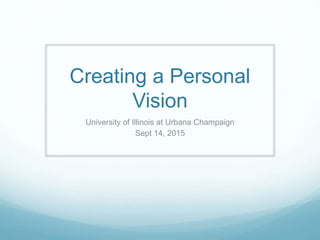UIUC Presentation 2015
- 1. Creating a Personal Vision University of Illinois at Urbana Champaign Sept 14, 2015
- 9. My initial “goals”  Learn about leadership and entrepreneurship  Increasing involvement in business  Increasing involvement with customers and partners
- 10. Some Steps ÔÇó Enrolled in entrepreneurship courses ÔÇó Moved to organizational leadership roles ÔÇó Increasing participation in business leadership ÔÇó Founded a non-profit ÔÇó Advisor to startups ÔÇó Attend meet-ups that touch upon entrepreneurship
- 11. Vision and Leadership ÔÇóClarity of decision-making ÔÇóAbility to listen ÔÇóAbility to influence
- 15. “I not only use all the brains I can have, but all the brains I can borrow”
- 18. In Summary  Know yourself  Set a personal vision you can believe in  Listen, especially to counter-points  Leverage resources, know constraints  Identify the observable/measurable goal or result  Influence to achieve your vision  Embrace change, adapt and course-correct quickly  Don’t be afraid to fail!
- 19. Tekspark
- 20. Tekspark  Non-profit for STEM diversity  Grassroots Engagement – middle/high schools  Spread the joy of STEM in formative years  Still in the early part of the journey
- 21. Vision Increase the number of women in STEM by 5% by 2020
- 22. Mission Catalyze progress towards a world with more diverse STEM presence, and empowering technology with diversity. Tekspark aims to engage with schools, universities and the industry at the grassroots level in promoting the choice of STEM for people with diverse, racial and ethnic backgrounds
- 23. How it evolved ÔÇó Initially, just the passion ÔÇó What did I want to see differently ÔÇó What is the unsolved problem this would solve? ÔÇó Did I feel convinced? ÔÇó More validation of ideas ÔÇó Leveraged network
- 25. Activities ÔÇó 1:1 Mentorship ÔÇó Panel Discussions ÔÇó Hackathons
- 27. Journey So Far ÔÇó Three high school partnerships launched ÔÇó 15 mentors enrolled ÔÇó 2 panel discussions held ÔÇó One contest conducted ÔÇó Target this year ÔÇó 30+ mentors ÔÇó Hack-a-thon involving multiple high schools ÔÇó More panel discussions ÔÇó Survey before and after school year
Editor's Notes
- #5: Dad – mechanical engineer, experimented with entrepreneurship – failed sometimes, succeeded sometimes. Head of school. Everyone I interact with influences how I think.
- #6: How do you set your own personal vision?
- #7: What are you naturally drawn towards – these could be activities or people. What do you admire? How do you picture yourself in 10-20 years from now. Examples from my experience that continues even now. Once you see this, then the how etc. are details.
- #8: What do you want to change in the world (business or in the community)? Do you see a picture that you can truly believe in? Only then this can become a vision that you can pursue with passion.
- #11: Direct customer interaction at Mindflash, direct partner interaction at Roku
- #12: Key aspects of leadership are the same as key aspects of vision Also each of us needs to be a leader in achieving our vision and take control
- #14: There is no right or wrong decision, there is only best decision with the information you know at the time.
- #15: Always surround yourself with honest critics
- #16: President Woodrow Wilson
- #17: Your assumptions when you had thought of your vision will change, the key question is how you can adapt to the change and still keep at your vision.
- #18: How do you make things happen with the resources and constraints you have
- #22: Vision needs to have a clearly observable/measurable impact associated with it.
- #24: In the role of being a mentor and working with both men and women, noticed some patterns that seemed to me to be “self-limiting”. There is a whole range of social and other external factors that need to be addressed but I was very fascinated by the psychological factors that seemed to be self-limiting. Differently – more meeting rooms with more women, more women staying on the job and being able to grow just the same as men, more women in decision-making positions and more women mentoring, networking and helping each other. I believed that this is all about instilling the passion and joy of STEM at an early age.
- #25: Ellen Johnson-Sirleaf, president of Siberia and a Nobel Peace Prize Winner
- #26: 30 mentors this year, 100 next year growing to thousands over time
- #27: Different segments had varied needs. Also mentorship came to the top rather than technical information. Difficulty getting partnerships with schools and libraries than I had initially assumed, had to work hard to get people equally passionate about the cause that could go above and beyond. There is a lot of untapped energy – space and time decoupling helps with promoting participation.



























